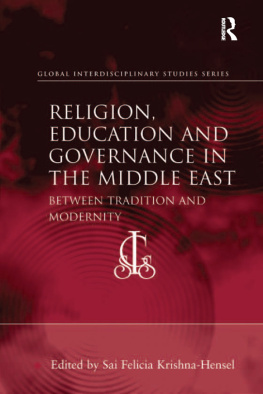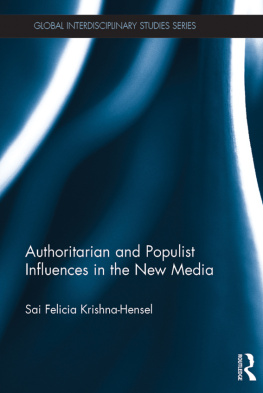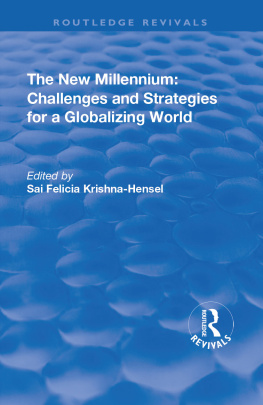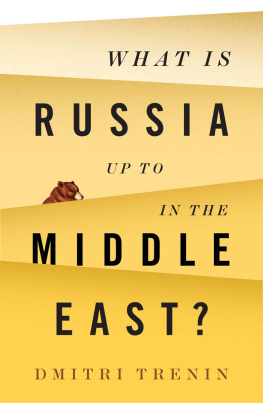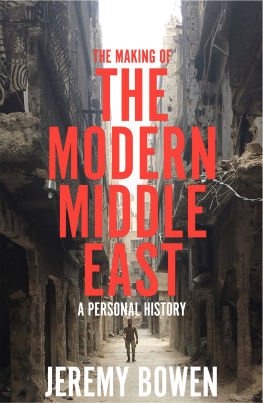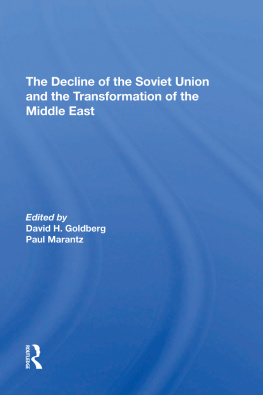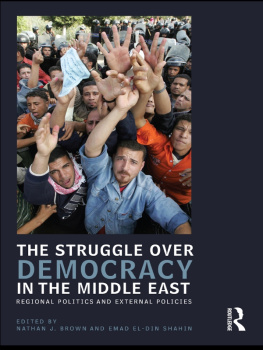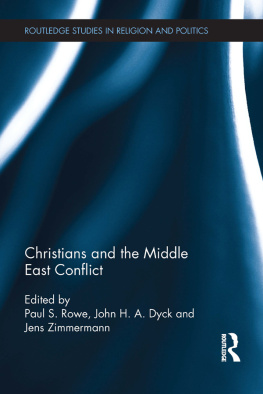RELIGION, EDUCATION AND GOVERNANCE IN THE MIDDLE EAST
Global Interdisciplinary Studies Series
Series Editor: Sai Felicia Krishna-Hensel
Interdisciplinary Global Studies Research Initiative, Center for Business and Economic Development, Auburn Montgomery, USA
The Global Interdisciplinary Studies Series reflects a recognition that globalization is leading to fundamental changes in the world order, creating new imperatives and requiring new ways of understanding the international system. It is increasingly clear that the next century will be characterized by issues that transcend national and cultural boundaries, shaped by competitive forces and features of economic globalization yet to be fully evaluated and understood. Comparative and comprehensive in concept, this series explores the relationship between transnational and regional issues through the lens of widely applicable interdisciplinary methodologies and analytic models. The series consists of innovative monographs and collections of essays representing the best of contemporary research, designed to transcend disciplinary boundaries in seeking to better understand a globalizing world.
Also in the series
New Security Frontiers
Critical Energy and the Resource Challenge
Edited by Sai Felicia Krishna-Hensel
ISBN 978-1-4094-1979-2
Cities and Global Governance
New Sites for International Relations
Edited by Mark Amen, Noah J. Toly, Patricia L. McCarney and Klaus Segbers
ISBN 978-1-4094-0893-2
Order and Disorder in the International System
Edited by Sai Felicia Krishna-Hensel
ISBN 978-1-4094-0505-4
Legacies and Change in Polar Sciences
Edited by Jessica M. Shadian and Monica Tennberg
ISBN 978-0-7546-7399-6
International Order in a Globalizing World
Edited by Yannis A. Stivachtis
ISBN 978-0-7546-4930-4
Religion, Education and Governance in the Middle East
Between Tradition and Modernity
Edited by
SAI FELICIA KRISHNA-HENSEL
Auburn University at Montgomery, USA
First published 2012 by Ashgate Publishing
Published 2016 by Routledge
2 Park Square, Milton Park, Abingdon, Oxon OX14 4RN
711 Third Avenue, New York, NY 10017, USA
Routledge is an imprint of the Taylor & Francis Group, an informa business
Copyright Sai Felicia Krishna-Hensel and the contributors 2012
Sai Felicia Krishna-Hensel has asserted her right under the Copyright, Designs and Patents Act, 1988, to be identified as the editor of this work.
All rights reserved. No part of this book may be reprinted or reproduced or utilised in any form or by any electronic, mechanical, or other means, now known or hereafter invented, including photocopying and recording, or in any information storage or retrieval system, without permission in writing from the publishers.
Notices:
Product or corporate names may be trademarks or registered trademarks, and are used only for identification and explanation without intent to infringe.
British Library Cataloguing in Publication Data
Krishna-Hensel, Sai Felicia.
Religion, education and governance in the Middle East : between tradition and modernity. (Global interdisciplinary studies series) 1. Middle EastCivilization21st century. 2. Middle EastPolitics and government21st century. 3. Religion and politicsMiddle East. 4. Political cultureMiddle East. 5. Democracy and educationMiddle East.
I. Title II. Series
956.054dc23
Library of Congress Cataloging-in-Publication Data
Religion, education, and governance in the Middle East : between tradition and modernity / [edited] by Sai Felicia Krishna-Hensel.
p. cm. (Global interdisciplinary studies series) Includes bibliographical references and index.
ISBN 978-1-4094-3986-8 (hardback : alk. paper) 1. Islamic educationPolitical aspectsMiddle East. 2. Islam and politicsMiddle East. I. Krishna-Hensel, Sai Felicia.
LC910.3.R45 2012
320.956dc23
2012016623
ISBN 9781409439868 (hbk)
Contents
Sai Felicia Krishna-Hensel
Alise Coen
Deina Abdelkader
Vnia Carvalho Pinto
Benedetta Berti
Krad Turan
Sultan Tepe
Yusuf Sarfati
Ebru Tekin
List of Figures and Tables
Figures
Tables
List of Contributors
Sai Felicia Krishna-Hensel, Director, Interdisciplinary Global Studies Initiative, Auburn University at Montgomery, USA
Alise Coen, Assistant Professor, Department of Political Science, Emory & Henry College, Emory, VA, USA
Deina Abdelkader, Assistant Professor, Department of Political Science, University of Massachusetts, Lowell, MA, USA
Vnia Carvalho Pinto, Assistant Professor, Institute of International Relations, University of Brasilia, Brazil
Benedetta Berti, Associate Fellow, Institute for National Security Studies (INSS), Lecturer, Tel Aviv University, Israel
Krad Turan, Assistant Professor, Gazi University, Ankara, Turkey
Sultan Tepe, Associate Professor, Department of Political Science, University of Illinois at Chicago, IL, USA
Yusuf Sarfati, Assistant Professor, Department of Politics and Government, Illinois State University, Normal, IL, USA
Ebru Tekin, Boazii University, stanbul, Turkey
Introduction
The Middle EastModernity, Religion, and Governance
Sai Felicia Krishna-Hensel
The Middle East has always been a geopolitically strategic region. The regions distinctive cultural and political divisions present a mosaic of states that do not lend themselves to simplistic interpretations. Developments in the region continue to remind us of the importance of understanding the complex forces that are driving change across a wide variety of societies. The worlds attention is drawn to the area not only due to its geographical location, and its possession of critical energy resources, but also because evolving socio-political patterns are a rich source for comprehending social change.
The continuity and dominance of traditional cultures in the region have sometimes been interpreted as signs of regression, and rejection of modernity. Nevertheless, it is important to approach the discourse on modernity from the foundation of historical tradition, in order to comprehend the development of innovative social, religious, and political institutions in the region. As is the case in other examples of regional development, the Middle East has constructed its contemporary institutions on a foundation of traditional social arrangements, values, philosophical assumptions, and everyday practices that are deeply rooted in its cultural heritage.
The patterns of political thought, the evolution of institutions, and the interaction between the customary patterns and Western influence have often been the basis of analysis of the Middle East as a whole. This line of reasoning reveals a vastly underrated diversity of experience and culture that makes for an unexpected complexity in interpreting developments in the region. The demolition of stereotypical interpretations is a by-product of the acceptance that there is not only diversity of cultures, but also diversity of interpretation, and execution of religious directives within the states of the region. The emergent pattern is one of sincere efforts to grapple with the desire for progress, while retaining some of the basis of existing cultural and political practices.

